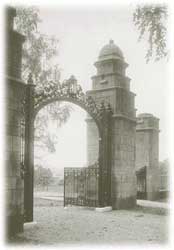12d. "Republican Motherhood"

Gate at Mt. Holyoke College, Massachusetts, founded by Mary Lyon. Lyon, Zilpah Grant, Judith Sargent Murray, and others educated in the years following the Revolution, opened the gates to further education for women.
Women's role in society was altered by the American Revolution. Women who ran households in the absence of men became more assertive. Abigail Adams, wife of John, became an early advocate of women's rights when she prompted her husband to "Remember the Ladies" when drawing up a new government.
Pre-Revolutionary ministers, particularly in Puritan Massachusetts, preached the moral superiority of men. Enlightened thinkers rejected this and knew that a republic could only succeed if its citizens were virtuous and educated. Who were the primary caretakers of American children? American women. If the republic were to succeed, women must be schooled in virtue so they could teach their children. The first American female academies were founded in the 1790s. This idea of an educated woman became known as "republican motherhood."
As in the case of the abolition of slavery, changes for women would not come overnight. But the American Revolution ignited these changes. Education and respect would lead to the emergence of a powerful, outspoken middle class of women. By the mid nineteenth century, the Seneca Falls Declaration on the rights of women slightly alters Thomas Jefferson's words by saying: "We hold these truths to be self-evident; that all men and women are created equal..."






